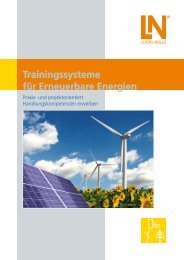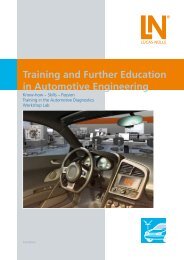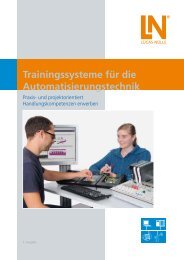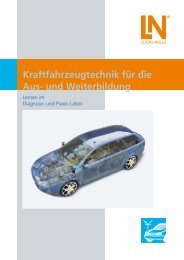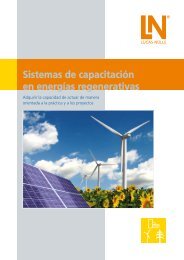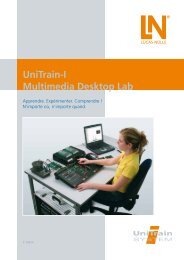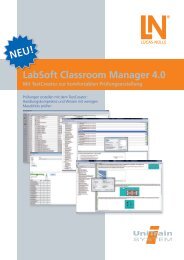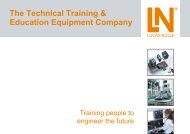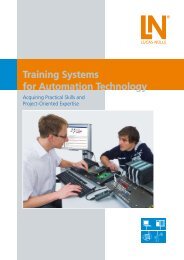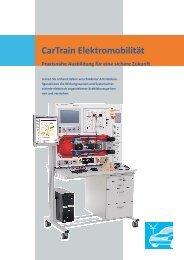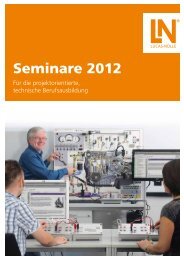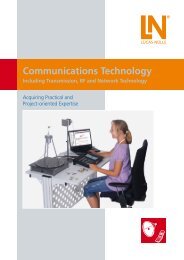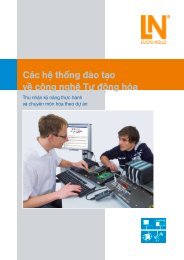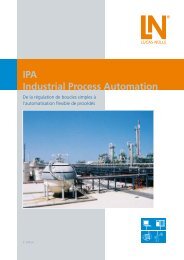Issue 2010 PRactIce - Lucas-Nülle Lehr
Issue 2010 PRactIce - Lucas-Nülle Lehr
Issue 2010 PRactIce - Lucas-Nülle Lehr
Create successful ePaper yourself
Turn your PDF publications into a flip-book with our unique Google optimized e-Paper software.
Future-oriented Training SystemsSunny prospects with the <strong>Lucas</strong>-<strong>Nülle</strong>photovoltaics training systemwww.lucas-nuelle.comwww.unitrain-i.com<strong>Lucas</strong>-<strong>Nülle</strong> <strong>Lehr</strong>- und Meßgeräte GmbHSiemensstrasse 2 • 50170 Kerpen-SindorfGermany2 Phone: +49 LN 2273 Practice 567-0 • Fax: 01 | +49 <strong>2010</strong> 2273 567-30www.lucas-nuelle.com • www.unitrain-i.com
EditorialDearReaders,The main topic of this issue of “LN Practice” ispower engineering and our special training andexperi menting systems developed for the area ofrenewable energies.The international community is striving to limit theEarth’s warming to a maximum of two degrees – as officiallystated in the declaration of the Copenhagen summiton climate change at the end of 2009.This objective can only be reached through the determinedutilisation of renewable energies. In our part of theworld, wind energy and solar power will undoubtedly bethe most productive and oft-utilised alter native energies.The fuel cell will also be making its contri bution in future,in stationary applications but especially as a mobile energysource.For this extremely important spectrum of topics, topqualitytraining systems have been developed by our staffin product management and development working in conjunc tion with reputable partners from industry. We wouldlike to introduce these learning systems to the reader inthis issue.The topic of power engineering will also be one of thehighlights at the upcoming Didacta trade fair in Colognerunning from March 16 to 20, <strong>2010</strong>. Furthermore, we arelooking forward to the Light + Building trade fair on April27 in Frankfurt, where we will be presenting the topic of“Renewable Energies in Electrical Engineering Trainingand Education”. We also welcome the opportunity toadvise you on how knowledge in this area can be con veyedusing multimedia-based training systems.In this issue we will also be reporting on developmentsinside our company involving the question of how moderndidactic approaches can be implemented using multimediabasedtraining systems. We will also be presenting ourclients’ successful training and education concepts as theysucceed both at home and overseas and reporting on the setof skills required of the automotive mechanic and specialistof tomorrow. We also look at how installation technologytraining is structured in the Netherlands.Furthermore, we provide insight into our understandingof sustainability and how it shapes our company philosophyand our day-to-day operations. In our opinion, planningand working in line with a keen sense of responsibility andsustainability has to be lived out in three different dimensions:the ecological, the social and the economic.Wishing you an enjoyable read,Rolf <strong>Lucas</strong>-<strong>Nülle</strong>01 | <strong>2010</strong> LN Practice3
ContentsContentsSustainability16–17 We play to win the long gameIn an interview, Christoph Müssener and Joerg Ludwig talk about sustainability in the company.20–21 Product page: new training systems<strong>Lucas</strong>-<strong>Nülle</strong> offers modern training systems for solar energy, wind power and fuel cells. The mostimportant features are presented here.22–23 Striking out on a future course based on sustainable resource utilisationA lot still has to happen in the UN Decade of Education for Sustainable Development. After all,teaching people to be aware of climate protection is an important educational aim.Professional further education and training for the future8–9 Qualifying as a master or a technician?These two career opportunities are the choices facing skilled workers with ambition. The decision tochoose one of these training paths decisively shapes subsequent vocational opportunities.10–12 Interview: modern instruction with multimediaDr. Felix Schmitz-Justen from the Institute of Technology and Education (ITB) at the University ofBremen reports on a new study into the didactic challenges facing teachers at vocational schools andinstitutions.13–15 Dual system training in the Netherlands: hearts, hands and heads combined– for better understandingROC Eindhoven is one of the most prestigious technical educational institutes in the Netherlands.Evidence is found here that practice-oriented training and education can succeed in the conventionalas well as the dual educational system.24–26 Good long-term career prospects for skilled automotive workersAlternative drives, especially the hybrid motor, represent new challenges for manufacturers andrepair garages alike – an opportunity for well-trained skilled workers.34–36 Automotive training at the Cologne Chamber of Skilled CraftsThe Chamber of Skilled Crafts in Cologne provides inter-company vocational training for around 200apprentices in automotive technology every year. This is a report on the practical side of this course.4 LN Practice 01 | <strong>2010</strong>
ContentsFrom inside the company27–29 Interview: success through intercultural expertise<strong>Lucas</strong>-<strong>Nülle</strong> has been operating in foreign markets for thirty years. For that kind of success,intercultural expertise plays an essential role. Senior staff report on their experiences in an interview.International projects30–31 BurundiAfter the civil war, this country has now turned its attention to education and to the future of the nextgeneration. Having equipped three schools there, <strong>Lucas</strong>-<strong>Nülle</strong> is now on location providing theteachers with intensive coaching on how to operate the training systems.32–33 USASUNY College in New York is the leading institution in the field of maritime navigational technology.As of very recently, future mariners will be learning on training systems from <strong>Lucas</strong>-<strong>Nülle</strong>33 Australia<strong>Lucas</strong>-<strong>Nülle</strong> adapted its InsTrain System for the Skills Tech Australia Institute to the extent that it iscompatible with the Janison multimedia training platform.Cooperation37 Sailing with a strong headwind into the new year: Lenze and <strong>Lucas</strong>-<strong>Nülle</strong>The long cooperation between these two companies is now also to be a success in the area of windenergy.38–39 Presenting safety technology of the mobile kindSiemens had been looking for a practical solution to its seminars and customer presentations. <strong>Lucas</strong>-<strong>Nülle</strong> developed mobile safety-technology modules which can be assembled and disassembled easilyand quickly at a moment`s notice.40 Betting on the right systemTeaching modern installation technology is no longer even conceivable without the InsTrain systems.The proof comes from experiences gathered at the Otto-Brenner Vocational School in Hanover.Miscellaneous3 Editorial6 Tips and trends7 Seminars/trade fairs01 | <strong>2010</strong> LN Practice5
Latest NewsUNESCO World Conference on Educationfor Sustainable DevelopmentDeclaration is now availablein nine languagesThe Bonn Declaration, adopted by the participants ofthe UNESCO World Conference on Education for SustainableDevelopment (Bonn, Germany), is now availablein nine languages, namely in English, French, Spanish,German, Arabic, Russian, Chinese, Danish andJapanese. The Bonn Declaration reflects the discussionsheld during the conference and provides a strategicorien tation for the second half of the UN Decade. Itattests to the importance of education for sustainabledevelop ment in the current world situation. It calls formaking a compact with the glo bal UN Decade of Educationfor Sustainable Development aimed at im provingknow ledge, skills and com petencies as well as streng theningvalues and attitudes oriented towards a tran sitionto a more just, fair and viable world.Download: http://www.esd-world-conference-2009.orgVocational training:International perspectiveThe last decade has given rise to a strong public discoursein the most highly industrialised economies about theimpor tance of a skilled workforce as a key response to thecom petitive dynamic fostered by economic globalisation.The challenge for different training regimes is twofold:attracting young people into the vocational training systemwhile continuing to train workers already in employment.Yet, on the whole, most countries and their training systemshave failed to reach these goals. How can we explainthis contradiction? Why is vocational training seen to be an‘old‘ institution? Why does vocational training not seem tobe easily adapted to the realities of the 21st century? Thisbook seeks to respond to these important questions. Itdoes so through an in-depth comparative analysis of thevocational training systems in ten different countries:Australia, Canada, Denmark, France, Germany, Korea,Mexico, Morocco, the United Kingdom and the USA.By Gerhard Bosch and Jean Charest, 2009Publishing house: Routledge, Chapman & HallINEPO <strong>2010</strong>: 18th International EnvironmentalProject Olympiad, May 19-22 in IstanbulThe aims of the INEPO actually run parallel to the oper ations carried out by the United Nations Group. The 21stelement of the declaration broadcast at the 1992 Rio deJaneiro con ference organised by the United Na tionsemphasises the importance of youth and inter na tionalcooperation. As environmental problems are world wide,we have no choice but to cooperate at a glo bal level. TheInternational Environmental Olympiad takes place inTurkey in the first week of June in World Envi ronmentWeek. The practical benefits of these projects can besum marised thus:Participating in finding alternative, eco-friendly energysources. Developing projects to eliminate pollutingagents. The preparation of groundwork for a recoverypro cess. Above all, important steps are taken in thecrea tion of friendship arrangements between countries.This is a great step taken in order to prevent warfare inthe long term. Investments in weapons can then bedirected to more humanitarian efforts.The youngsters compete with each other to gain a place.But ultimately, everyone returns to their countries with afeeling positive. This is because there are other thingswhich people gain from the competition, such as studentsfrom different countries and cultures meetinghere, ming ling and sharing their opinions.http://www.inepo.com/International conference: technology-enhanced learningThe 1st International Conference on Technology-enhancedLearning, Reforming Education and Quality ofTeaching <strong>2010</strong> is a bold effort aiming to foster the debatefor the global need in turbulent times to invest in educationand to go beyond mere verbalisms. It is intendedto be the leading academic conference for technologyenhancedlearning.http://www.reform-education.org/6 LN Practice 01 | <strong>2010</strong>
Latest NewsTRADE FAIR DATESUSA20–23.06.<strong>2010</strong>ASEELouisville, Kentuckyhttp://www.asee.org/conferences/annual/<strong>2010</strong>/index.cfm02–04.12.<strong>2010</strong>ACTELas Vegas, Nevadahttp://www.acteonline.org/convention.aspxFrance10–12.05.<strong>2010</strong>M@DI/Intertice <strong>2010</strong>CNIT Paris la DéfenseALGERIA01–03.03.<strong>2010</strong>International Workshop on Physics:Renewable energies, INWOP’10Centre Universitaire d’El OuedEl Oued26–28.05.<strong>2010</strong>2nd Official International Days onElectrotechnology, Maintenanceand Electromagnetic CompatibilityENSETOran, El OuedVietnam01–03.12.<strong>2010</strong>Worlddidac VietnamInternational Center for ExhibitionHanoihttp://worlddidacvietnam.com/Angola20–25.07.<strong>2010</strong>FILDA <strong>2010</strong>,LuandaRUSSIA15–17.04.<strong>2010</strong>“Education Beyond Borders”Krasnaja Presnja exhibition centreMoscow28.09–01.10.<strong>2010</strong>“The Educational Environment”VDNH ForumMoscowKAZAKHSTAN25–27.05.<strong>2010</strong>KiTel trade fairAlmatyTURKMENISTAN08–10.09.<strong>2010</strong>“Science and Education:a Renaissance”AshgabadAZERBAIJAN06–09.10.<strong>2010</strong>“Education and Career”in Baku01 | <strong>2010</strong> LN Practice7
Vocational TrainingNational and international comparison of the two mainpaths to gaining advanced technical qualificationsMasters oftechnologyLifelong learning is more important thanever for skilled workers as their jobs becomeincreasingly demanding. The two advancedqualifications as master craftsman ortechnician are given particular recognition.Which qualification is suitable for whom isnot an easy question to answer. It dependswhat kind of career path the individualwants to pursue afterwards. Internationalrecognition of the qualification mightalso be a consideration as the trainingand advanced training of technical andmanagerial staff is organised differentlyfrom country to country.No-one is born a master,” says an old proverb. Thisshould really be widened to include technicianstoo. Both training routes make exacting demandson trainees who are seeking to improve their career prospects.Nevertheless, there are important differences betweenthe two types of training, which will affect thetraining process itself as well as subsequent career deve lop ment. A master craftsman training course is less complicated and, for that reason, can seem more appealing tosome people at first. Even journeymen that have justpassed their test can now go straight to a school for mastercraftsmen. Potential technical professionals, however,must be able to show proof – usually employer confirmation– of one to one-and-a-half years of work experienceafter successful training, depending on the federal state inquestion, before they can apply to the relevant school. Themajority of schools charge a fee towards costs, which inmost cases comes to a few hundred euros per semester orsession. The master craftsman training course is shorterthan the technician training course, but is significantlymore expensive, depending on the chamber of skilledcrafts responsible for the school.Master craftsmen: finished quickerand always in demandYoung people must factor in an expenditure of around10,000 euros before they can take their master craftsman’sexamination after completing around 800 hours of training.The training period for technicians is more than twice aslong. Consequently, trainee technicians study a widerrange of subjects than trainee master craftsmen. Theseoften include subjects that are not directly related to thetrade in question, such as general mathematics, businessmanagement or technical English as well as personaldevelopment modules which are designed to equip thetrainees for promotion to middle management positions.Where this additional, general knowledge is not required,for example in a skilled crafts enterprise, the mastercraftsman course provides a quicker route to the desireddestination.Otto Kentzler, President of the German Confederationof Skilled Crafts (ZDH), explains: “For managers in skilledcrafts enterprises, the master craftsman certificate is theideal qualification. It stands for a high level of technicaland business expertise and prepares the holder for themany and varied demands of managing small and mediumsizedenterprises. Master craftsmen are in demand –whether it be as independent contractors or in managementpositions. The high status they enjoy in the trade is alsoreflected in their salaries.”On the way up: technicians reachmiddle management positionsIn medium-sized industrial enterprises and largeconcerns, however, technicians often have better prospects,8 LN Practice 01 | <strong>2010</strong>
Vocational Trainingmasterly techniciansincluding in relation to salary, because here they are oftenemployed in combination with, and sometimes on thesame level as, graduate engineers. “Technicians are alwaysrequired when the work in question is of a practical ratherthan theoretical nature. At the same time, they often workalongside engineers who have a more theoretical orien tationby virtue of their education,” says Peter Schüly fromVerein der Techniker e.V., one of the largest organisationsfor technical professionals in Germany. Many state-certifiedtechnicians really are specialists in their field as thereare over 400 technician courses covering a very widerange of specialisations. Whereas at the beginning of the20th century, training was only offered for mechanicalengineers, today there are technical schools and coursescovering almost every branch of industry.“Most of the schools work very closely with local industry,thereby ensuring that the education planners at theseschools know exactly which skills are in demand. Thisclose cooperation allows new requirements to be integratedinto the curriculum very quickly. As a result, most of thetrainees quickly find a job after completing their course”,says Peter Schüly.Both qualifications are valuable, not just in terms ofjob searches and career prospects, but also for furthereducation and training. Both master craftsmen and technicianshave for years been admitted into German highereducation institutions even without the usual universityentrance qualifications. However, the chosen area of studymust be relevant to the student’s educational background.An automotive technician, for example, would be perfectlyentitled to enrol in a classic mechanical engineering course.Internationally recognised: theBachelor professionalIn other countries, at the very least the technicianqualification is already frequently regarded as equal to acollege qualification, for it is these tertiary education institutionswith an emphasis on technology that are trainingthe future generation of skilled workers. Depen ding oneducational background and the target qualification, thiskind of course would normally last two to three years. Atthe end of the course, the students can either be awarded adiploma – not to be confused with the German ‘Diplom’ –or a Bachelor degree. In order to internationalise andenhance recognition of the German technician qualification,the European technical professionals association EurEtahas been campaigning for the adoption of the “Bachelorprofessional” title, which German and other Europeantechnical schools can award their students as an additionaltitle. In some countries, this qualification even enablesstudents to embark on a course of study at Master’s level.However, the final decision on the recognition and equivalenceof a qualification obtained in Germany rests withthe relevant educational institution in the country concerned.The same applies the other way round. A technicianqualification gained abroad does not necessarily qualifysomeone to study in Germany or any other Europeancountry. The universities check each case individually andexamine the course curricula and the student’s performancein detail. In most cases, direct entry to higher years is notpossible. However, the conversion of student performancebased on the European Credit Transfer System is designedto facilitate comparability in the medium term and thusopen up new prospects for students. In industry, bycontrast, an individual’s skills are more important anywaythan the official recognition of a title.The chambers of skilled crafts have also been workingtowards recognition in practice, in order to make themaster craftsman certificate competitive internationally.Otto Kentzler explains: “The German master craftsman’sexamination is well-known in many countries and the expertiseof German master craftsmen is in demand worldwide.Within the EU, the master craftsman quali fi cation isalso included in the EU’s directive on the recog nition ofprofessional qualifications. This means that Ger manmaster craftsmen can generally find work in other Europeancountries without any problems. Furthermore, wehave signed special equivalence agreements with severalcountries, including France and Austria, which ensurereci procal recognition of the master craftsman qual i fi cationsin these countries. However, there is no inter nationalrecognition mechanism in place as the differences betweenmany education systems are too great.”01 | <strong>2010</strong> LN Practice9
Vocational TrainingA recent study reveals the growing demands on vocational teachersand the resulting training requirement.Media skillschallengeVocational teachers of technical subjects are underconstant pressure to keep up to date with the latestfast-moving developments and, over and above this, toundergo ongoing training in the field of teaching andorganisational skills.In 2009, the Institute of Technology and Education (ITB) at the University of Bremen, whosescientists have been researching vocational education for over 20 years, carried out a major studyon the situation of vocational teachers of electrical engineering and information technology inGermany. One particular area of interest to researchers related to teachers’ training requirement,their technical competence and the use of media-supported systems in the classroom. This studywas sponsored by <strong>Lucas</strong>-<strong>Nülle</strong>. The participating schools had the chance to win a UniTrain-Iblended learning system, which facilitates the teaching of technical subjects based on the verylatest didactic concepts. The following interview with Dr. Felix Schmitz-Justen, who designedlarge parts of the study, highlights the challenges currently facing vocational teachers,particularly in terms of further training.Mr. Schmitz-Justen, what are the biggest challengescurrently facing vocational teachers intheir day-to-day work?In our survey, we asked the teachers to name all theactivities that they are involved in as part of their job. Theywere then asked to assess the challenges – in terms of time,methodology and content – associated with the individualactivities. What came out was that the biggest time-relatedproblems for vocational teachers at the present time areassociated with the implementation of the learning fieldconcept. Equally, the teachers find that administrative andorganisational tasks also make demands on their time.These include obtaining or repairing apprenticeship workshopequipment. While the latter do not involve any challengesrelating to methodology or content, imple mentingthe learning field concept is a major challenge in thisrespect.What do vocational teachers think of the reorganisationinto learning fields and what is the training requirement inthis area?The requirement for action-oriented teaching – i.e. theimplementation of the learning field concept – has affected10 LN Practice 01 | <strong>2010</strong>
Vocational Trainingall vocational teachers since the reorganisation of apprenticeshipsin 2001. In view of the content and methodolgyrelatedproblems facing vocational teachers – particularlyvocational teachers still adhere to the former subject-basedmethod of teaching. For example, many of those surveyedby us still rely on traditional teaching concepts. This isin terms of implementing the learning fieldreflected in the high level of teacher-centredConventionalconcept – an appropriate qualification forinstruction. Teaching from the front of theinstruction from thevocational tea chers is particu larly desirable atfront of the classroomclassroom is still very widespread at mostthis point. This qualification must be aimed at is still very popular schools. This is hardly compatible with aenabling or making it easier for vocationalteachers to implement the learning fieldat most schools. concept such as that of learning fields. If thenew concept is to be implemented, teachersconcept. Other wise a situation will persist in which theycan not fully harness the potential of didactic learning fieldwork, with trainees not benefiting from the sensiblereforms as a result.What are the consequences of this situation for teaching?The high demands facing vocational teachers when itcomes to implementing the learning field concept can beseen from the answers on specific teaching practice thatwere provided in our survey. These suggest that manyneed to cooperate more closely with one ano ther. Althoughthey report basically positive teamwork experiences, suchteam work rarely takes place on a day-to-day basis.New didactic concepts can often be implemented moreeasi ly and efficiently by using different media. Thisrequires teachers to have well-developed media skills.What strengths and weaknesses have you found in thisrespect?Our survey also asked questions on the subject of mediaand Internet-based systems. If one asks vocational teachersabout their IT skills compared with the IT skills of theirtrainees, there is obviously a big difference betweenclassic programs and Web 2.0-based systems. While theUniTrain-I01 | <strong>2010</strong> LN Practice 11
Vocational Trainingvocational teachers feel that they clearly have the edge ontheir trainees when it comes to using classic office software,they admit that their trainees are more skilled in the use ofwikis, podcasts, blogs and online communication programs.It’s a shame, however, that the teachers are generallynot making use of existing IT skills in order to support thetrainees’ learning processes. The teachers hardly usemedia and Internet-based systems in class, even thoughthere is nothing stopping them from doing so.What is the reason for this reluctance? Are vocationalthat most of the products available on the market are notadaptable. The fact that individual changes or enhan cementscannot be made to the text and media con tent leadsto problems with acceptance.How should learning software be structured to allowteachers to make optimum use of it in lessons?As a consequence of the aforementioned experiences andfindings, the idea of rapid e-learning is following a fundamentallydifferent path from more “classic” e-learningapproaches. Learning software must be designed so thatteachers not yet sufficiently convinced by theproven benefit of media-based systems?On the contrary. Our study showed that, inspite of their reticence, the teachers considerall the components that can be covered byThe objectiveis customisedlearning software.the users – i.e. vocational teachers, instructorsand trainees in the case of technical vocationaltraining – can easily make changes to the contentwithout special expertise in media technology.The aim is “individualised learning software”learning software to be important and bene ficial to vocationalteaching. In particular the repre sen tation of technicalfunctions and expertise as well as the visuali sation of workprocesses were singled out as especially important by thevast majority of teachers.This latest survey backs up the conclusion of earlier onesthat the low level of use is, instead, attributable to the factthat is tailored to the specific conditions and requirementsof each case.The vocational teachers basically confirmed the greatpotential of digital media in the online survey. The prioritymust now be to harness this potential to a greater extent intechnical voca tional training and education.Thank you for talking to us.TipUniTrain-Ithe multimedia training systemfor the vocational trainingof technicians and engineersFor over 10 years, trainees and apprentices have been learning with the UniTrain-Imulti media-based training system from <strong>Lucas</strong>-<strong>Nülle</strong>. The system elicits an enthusiasmfor all things technical and promotes learning by integrating a hands-on approach tothe mastering of theory and practice based on real experiments that are embeddedin a multimedia learning program. The individual trainee can complete the programindependently at his or her own speed. Consequently, the instructor has more timeduring the instruction phase to provide individual assistance and to also steer theeducational process. The modularly designed system is convincing thanks to its provendidactic concept, high user friendliness and a solid price-performance ratio. To put itsimply, UniTrain-I offers the wide experimentation range of a large laboratory in anextremely compact package.12 LN Practice 01 | <strong>2010</strong>
Vocational TrainingA visit to Regionaal Opleidingen Centrum (ROC) EindhovenDual system training in the Netherlands:hearts, hands& heads combined– for better understanding!Take your choice – the classroom or on-the-job training? Just as in Germany, young people inthe Netherlands have both alternatives open to them. Both training approaches emphasiseinstruction in the four critical fields of competence. Ries Luijsterburg, Technical Director of ROCEindhoven and Representative of InduTeq, the foundation for advanced training, reports onthe Dutch System and on new quality requirements.The technical courses offered by (ROC) Eindhoventake place in a building formerly owned by Philipsand currently under monument protection. Cooperative ties still exist to the electronics manufacturer whichis to this day still located in ROC’s immediate vicinity.Accordingly, ROC provides advanced vocational trainingto employees from Philips and many ROC trainees go toPhilips to complete the practical training component oftheir dual vocational training programme. Upon graduation,the approximately 1,500 students currently in trainingat ROC start their careers with rosy prospects thanks inparticular to ROC’s reputation for focussing on the acquisitionof practical hands-on skills which are also a focus inthe classroom curricula. This is an absolute necessitybecause only half of the students have signed up for dualtraining, the other half pursue a technical profession in apurely conventional classroom-based course. The choiceof programme is completely at the discretion of the trainee.Most professions and vocations are offered in both thedual system as well as the conventional school approach.The number of students taken in each year is determinedby their training levels. Depending on the students’ previousexperience and qualifications, there is a choice betweena one and four-year training programme, which canalso be continually supplemented.Students and trainees who opt for the dual system programmenormally work four days at a company and spendone day at a vocational college. The theoretical componentof the training is supplemented by self-learning phases,which the student or trainee can complete on a flexiblebasis adapted to fit his or her work schedule in the schoollabs.“In the laboratories our trainees conduct the experimentsto a large extent on their own, although there is an instrucCourse of study Qualification Duration1 Training to be an assistant Simple job qualification 6 months to 1 year2 Vocational training Job performance qualification 2–3 years3 Technical vocational training Independent work performance 2–4 years4 Special education + Independent work performance 3–4 yearsexpert training with specialisation (1-2 years of specialised training)01 | <strong>2010</strong> LN Practice 13
Vocational TrainingRies Luijsterburg Apprentices at ROC Lutz Schulz training ROC specialistteachersConventional schooling or dual system:When you have the choice...tor on location to assist them, if problems or questionsarise”, explains Ries Luijsterburg, Technical Director atROC Eindhoven and the person responsible for purchasingequipment for the laboratories and classroom facilities.<strong>Lucas</strong>-<strong>Nülle</strong> supplies many of the experiment stationsfor the areas of automation technology, electrical engineering,installation technology and mechatronics.“We have had a lot of positive experience with these systems.Above all, the didactic approach that promotes independentlearning and holistic instruction goes a long waytoward meeting our demands. Regarding the UniTrain-Isystem featured in the program, this system is used insmall projects to help boost the skills and competence ofthe students who work on their own virtually without anyhelp at all”, says Ries Luijsterburg in explaining the decisionto purchase <strong>Lucas</strong>-<strong>Nülle</strong> systems.Purely conventionalschoolingTrainees over 18 have topay school fees.Trainees have all-dayinstruction in the schooland complete so-called“stages”, practical trainingphases lasting severalweeks inside a company.Each of the four levels isoffered.The conventional schooltraining leads to arecognised vocationaltraining degree at one ofthe four levels.Dual systemTrainees receive a salarywhich is linked to the Dutchminimum wage scale.Trainees work four days ofthe week in a company orfactory and study one dayin a vocational school. Inaddition to this, theyparticipate in self-learningphases in the school labs.Depending on what level isbeing sought, it may bedifficult to find a dualsystem training place in acompany.The dual training programalso leads to a recognisedvocational school trainingqualification at one of thefour levels which thestudent can build on.Four areas of competencePractical skill is one of the four core competences symbolisedby “feeling and handling, thinking and understanding”, and is being promoted by binding stipulationsfor all technical training programmes. It goes into effect asa new qualification level as of mid-<strong>2010</strong>. The fact thatpersonal attributes – normally seen as personality-specificand frequently referred to as soft skills – are ranked ashighly as so-called hard skills is a result of the incrediblechange taking place in the work environment.Industry demands soft skills“We have recently conducted a representative survey ofcompanies performing training in our region, i.e. thecatchment area around ROC Eindhoven, and haveconcluded that the clear and unambiguous message is thatpersonal attributes like teamwork, creativity and reliabilityare seen as just as necessary for success in training andany subsequent career as well-grounded technical knowhow”,reports Ries Luijsterburg.In order to instil these four competences, the teachingapproach at ROC has undergone enormous change overthe years. Today, conventional instruction from the frontof the classroom accounts for around 30 percent of thetime needed by vocational school instructors to convey therequired basic theoretical information and to compile and14 LN Practice 01 | <strong>2010</strong>
Vocational Trainingcompare results at the end of a series. But even in thesetheoretical phases, the four competences are still in focus.Naturally, one feature is to have the students present theknow-how they have acquired in group presentations – inEnglish or in another foreign language. Students and traineesalso work in small groups on projects. This means thatthey have to rely on each other to be successful inindependently tracing individual work steps and exploringtechnical contexts without constantly calling on the instructor for assistance. This sounds demanding, but itmeans an enor mous leap in motivation for the students.Advanced training for vocational teachers:putting practical training at the focal pointNaturally, all of this means teaching personnel also needto develop to keep up. Their role is evolving from thedominating figure at the head of the classroom, guidingstudents through the material, explaining and dictating thetempo, towards someone who is more of a facilitator andmentor who provides assistance and fresh motivation. Thisalso means that the instructor has to relinquish morecontrol and have confidence in his or her students. Tocome to grips with this revolution, further and advancedteacher training in the Netherlands takes up a considerableamount of the work year: 160 hours of further training ismandatory for the vocational teacher. At first glance, thisseems to be a huge investment in terms of time, but it’sworth it. The teachers are also given considerable freedomin determining their own personal further training programmeand receive support from their employers as well.“The self-learning segment also involves reading currenttechnical literature or dealing with new technologies”,explains Ries Luijsterburg, “while the employer isresponsible for organising the remaining portion of thetraining programme. Each school may have a differenttraining focus depending on the school’s curri cula.” Thismay include, for example, seminars on tech nical anddidactic topics and information seminars but may alsoinclude tours of industrial facilities. The practical, handsoncomponent of the programme plays a huge role infurther teacher training. This helps to ensure that theinstructors do not lose touch with current developments inindustry, even after long years of teaching in the classroom.In conjunction with industry, the InduTeq foundation,where Ries Luijsterburg represents his school, regularlyoffers advanced further training in technical and didacticdevelopments for vocational instructors. The mostimportant aspect of these seminars is that they are directlyrelated to actual practice. Right now the biggest issue isthe so-called four competence areas and how they arereflected in the classroom. To familiarise teaching staffwith the potential within the field of installation technologycourses to convey the four competences, InduTeq hostedan information day at ROC Eindhoven, where the InsTrainSystem from <strong>Lucas</strong>-<strong>Nülle</strong> GmbH was introduced.“Ideally, training and educational facilities in the regionshould all work in concert when it comes to implementingtraining and education reforms. In the area of electronicinstallation and wiring technology, the InsTrain system isideal because it contains not only all the necessary componentsbut also the right didactic platform needed for thenew qualifications framework”, explains Ries Luijsterburg.A shared foundation for instruction is a guarantee that thestudents are all on the same or similarly high levels. “Andultimately that is our aim: to empower young people toobtain a vocational qualification and to graduate into asuccessful working life”, says Ries Luijsterburg.Cooperation beyond bordersFor so-called European trainees and apprentices(Euzubis), who get training in different countries, thereis a website of the same name offering interesting infor -mation. Here trainees and apprentices can find out underwhat conditions training in Germany is officiallyrecognised: http://www.euzubi.eu/Vocational and advanced training in theNetherlandsFor young people who would like to complete theirtraining in the Netherlands, the information brochureprovided by the Arbeitsagentur Kleve (EmploymentAgency Kleve) offers a good overview:http://www.eab-info.com/Infobroschuere.pdfFurther teacher training in the NetherlandsInduTeq:The webpage for the InduTeq foundation, which organisesthe practical side of further education and training forteachers in technical subjects in the Netherlands:http://www.induteq.nl/In conjunction with InduTeq, <strong>Lucas</strong>-<strong>Nülle</strong> GmbH offersinformation seminars and master classes covering certaintechnical topics.01 | <strong>2010</strong> LN Practice 15
SustainabilityJoerg Ludwig: Also the topic of renewable energies hadbeen on the radar for an extremely long time because weare real believers in sustainable technologies. For ten yearsnow we have been offering a training system on photovoltaictechnology. So you could say that we anticipatedthe current boom in renewables. The beautiful thing aboutthis is that we already have fully developed trainingsystems in solar energy, hydrogen and wind power at ourdisposal. Our wind power training systems in particularare highly innovative and technically quite comprehensive.And the topic itself is by no means exhausted because thetechnology itself keeps presenting new problems andsolutions which need explaining and understanding.What challenges are you currently contemplating?Christoph Müssener: Right now the most intense issueconfronting us is the question: How do we distribute andstore the electric current obtained? There is a tremendousamount of work to do in this area and we are alreadyoffering systems designed to deal with the topic ofintelligent power mains – the so-called “smart grid”. Thesecourses are designed for instruction both on the vocationaltraining level as well as the university level. Currentlyabout 50 % of our development budget flows into renewableenergies – so we are playing to win the long game.01 | <strong>2010</strong> LN Practice 19
SustainabilityWind power“Small wind power plants”training panel systemThis training system teaches the trainee the basics needed tounderstand the operation of small wind power plants. Autonomouslearning is made possible by the “Interactive LabAssistant“, a multimedia training environment that con tains allthe important instruments, instructions and documentation.The trainees quickly become acquainted with the physicalfundamentals and learn how generated power is stored andultimately how to build an off-grid system with which theycan generate an alternating current of 230 volts. They alsogain insight into hybrid systems which can generate currentout of wind power and photovoltaic energy.”With the small wind power plant training panel system, weare providing vocational instructors with a powerful systemfor the off-grid operation of a wind power plant, all with multiplehands-on applications“, says Ralf Linnertz, ProductMana ger for the area of Renewable Energies.Solar energyUniTrain-I “Photovoltaics“As a standalone system, the UniTrain-I board for photovoltaicstraining combines all the components needed for trainingthe fundamentals of this renewable energy technology. Thetrainees learn how solar cells are manufactured and how theyoperate, as well as how solar batteries are designed. Theylearn how to record the characteristics of solar modules, howsolar cells are connected up and how to explain the influenceof temperature, irradiation intensity and angle of incidenceon a solar module. Methodical fault simulations challenge thetrainee to put into practice the knowledge and skills learnedin the course.”The UniTrain-I System for photovoltaics is the right solutionfor anyone who wants to acquire the basic knowledge ofthis field”, explains Ralf Linnertz, ProductManager for the area of RenewableEnergies.“Wind power plants with double-fedasynchronous generators”training panel systemThis state-of-the-art training system enables the student tobecome acquainted with different types of modern windpower stations. The necessary physical context is exploredwith the aid of many graphic animations. In the hands-onsection, the students examine a double-fed asynchronouswind generator just like the ones used today in modern largescalewind power stations. The trainee operates it in thelab under realistic conditions including varying wind forcesand loads. Additionally, it is possible to study the system’sresponse to power grid failures because the system is “faultride-through”capable.”This innovative system brings trainees and students up todate with the state-of-the-art of this fascinating technology.Thanks to the “Interactive Lab Assistant”, a multimedia experiment environment is available which encompasses all ofthe important instruments, instructions and documen tation“,says Christoph Müssener, Head of Business Development.20 LN Practice 01 | <strong>2010</strong>
SustainabilityFuel cells“Advanced Photovoltaics”training panel systemThe photovoltaic system designed for advanced studiesfamiliarises trainees and students with the practical andtheoretical fundamentals of photovoltaic technology. Thesystem was conceived to demonstrate how photovoltaicsystems operate in a highly realistic fashion, including howthey are put into operation and maintained. The solar cyclesimulation provides the student with an extremely realisticenvironment for experimenting. The use of solar emulatorspermits industrial components such as charge regulators andinverters to be operated right in the lab. The “Interactive LabAssistant” embodies all of the important instruments anddocumentation in a multimedia experiment environment andalso promotes independent learning.“Using the Advanced Photovoltaics System, instructors canprovide practical instruction over the entire spectrum of thistechnology. The solar cycle which can be set to correspond toany location offers special incentives to the students“, saysRalf Linnertz, Product Manager for the area of renewableenergies.UniTrain-I “Fuel Cell Technology”This course on fuel cells from the UniTrain-I series consists ofmany practical experiments on the basis of which the currentstate of this pioneering technology is demonstrated. Traineesthus learn how fuel cells are designed, how they operate andhow they are commissioned. After completing this coursethey are in a position to explain the electrochemical processesof electrolysis, configure fuel cells and understand the operatingprinciples of an electrolyser. Students and trainees carryout experiments that cover Faraday’s laws and on how todetermine the energy efficiency of fuel cells.“At first glance, the physical and chemical foundations of fuelcell technology are fairly complicated. But with our system,the trainee is not only able to grasp these concepts but tointernalise them in a sustainedway“, says ChristophMüssener, Head ofBusiness Development.“Advanced Fuel Cells”training panel systemThis system provides a safe environment for experimentingwith hydrogen and fuel cells. It is comprised of a 50-VA fuelcell stack, a metal hybrid storage unit and an electronic load.The corresponding interactive multimedia environment has allof the measuring instruments, experiment instructions anddocumentation integrated into it. To allow for independentself-learning, the multimedia learning environment containsthe “Interactive Lab Assistant” as well as all the measurementinstruments and instructions.”For the advanced learner who wants to get a more in-depthlook at fuel cells, the advanced system is ideal because itcontains all of the components needed for near-industrialwork conditions“, says Jörg Ludwig, Product Manager for thearea of Energy Technology.01 | <strong>2010</strong> LN Practice 21
SustainabilityStriking out ona future coursebased on sustainableresource utilisation“Training that focuses on sustainable development teachesour children, young people and adults alike how to thinkand act in an environmentally sustainable way. It puts peoplein a position to make decisions for the future and at thesame time assess how their own behaviour will affect futuregenerations and life in other parts of the globe.“UNESCO definition for sustainable training and education22 LN Practice 01 | <strong>2010</strong>
Vocational TrainingGood long-term career prospects forQualified employees with these skills and attributeswill soon be in demand by manufacturers as well ascar repair garages. The economic crisis and theinvestments in green technology designed to stimulate theeconomy are accelerating an already irreversible trend.“It goes without saying, therefore, that the new technologiesof the hybrid drive are covered in the classroom.One of the ways in which the students can prepare for thisis by taking more in-depth courses. We have had verygood expe rien ces with the automotive training systemsfrom <strong>Lucas</strong>-<strong>Nülle</strong> because they combine theory and practice,which has a strong motivational effect on the stuskilledautomotiveworkersLeading vocational and advanced training institutes are focusing on theteaching of new technologies such as hybrid technology in an effort to preparethe young people of today for the automotive industry of tomorrow. Socialskills are equally as important for a successful long-term career.dents,” says Dr. Eberhard Schwarz from the NikolausAugust Otto vocational college in Cologne-Deutz, explainingthe training concept adopted by the institution.TAK, the Technical Academy of the German AutomotiveTrade, has also been offering advanced trainingcourses in hybrid technology for some time, e.g. in Munichand Kassel. “We are convinced that this technology has abig future. Automotive businesses will soon be strugglingto cope without appropriately qualified employees whopossess the relevant skills in this area,” explain the trainersfrom the automotive trade association in Kassel.24 LN Practice 01 | <strong>2010</strong>
Vocational TrainingGreen drives on the upswingThe race for alternatives to the conventional combustionengine is in full swing. Cars will steadily becomecleaner and more energy-efficient. The next few decadesare likely to see a wide range of technologies coexistingwith one another – including alternative fuels such assecond generation biofuel or gas-to-liquid diesel – andfurther innovations like “homogeneous charge compressionignition,” according to a recent study on the future of mobility carried out by Z-Punkt GmbH, a futurology researchcompany. It predicts that classic hybrid engines will befollowed by fuel cell hybrids and battery-powered electriccars.As far as the garages are concerned, a key commonfeature of these drives is that, in some cases, their employeeshave to work with high-voltage systems. The usual 14volts is often not enough for electric cars, so systems withup to 650 volts are not unusual. The necessary repairs maytherefore only be carried out by trained automotive technicians.They must be able to prove that they have completedadditional training which qualifies them as trainedelectrical technicians for HV systems in motor vehicles.“There is a dual benefit to businesses which provide suchtraining to their employees because skilled techniciansthat have been trained in this way are allowed to instructand supervise other employees in working with highvoltagesystems in motor vehicles,” explain the trainersfrom the ZDK. The relevant courses are offered by theTechnical Academy of the German Motor Trade (TAK).Gerhard Soßdorf from the ZDK Kassel explains that“demand for this additional quali fication will grow steadilyover the coming years. So long as the necessary hybridtechnology skills are either not integrated, or inadequatelyintegrated, into the three-year dual vocational trainingcourse for automotive mecha tronics technicians, theindustry will be reliant on people with additional training.”The renowned academy uses the UniTrain-I course“Hybrid drives in motor vehicles” from <strong>Lucas</strong>-<strong>Nülle</strong> forthe two-day training course that leads to the additionalquali fication of ‘skilled electrical technician in the automotive trade’. “As one of the few providers, <strong>Lucas</strong>-<strong>Nülle</strong>GmbH took up this topic at an early stage and translated itinto a high-quality training system based on state-of-thearttechnology. Added to this there is the system’s flexibility.At the moment, hybrid technology is only coveredby our advanced training courses, but in the future thiswill be extended to apprenticeship training courses. Wealso want to use the UniTrain-I system in initial dualvocational training,” says Gerhard Soßdorf, explaining thedecision to opt for <strong>Lucas</strong>-<strong>Nülle</strong>.“At the moment, important hybrid technology-relatedinformation and skills are primarily being taught andoffered in advanced training courses,” says SiegfriedSchulz, Product Manager for Automotive at <strong>Lucas</strong>-<strong>Nülle</strong>,and a former instructor at the BBV-Prenzlau vocationaltraining association and also member of the examiningboard at the Uckermark motor trade association. “Thesystems integrate practice and theory so closely and guidestudents through this complex topic in such small stepsthat they can also be used for teaching in vocationalschools, for specialised practical training and for examinations.”01 | <strong>2010</strong> LN Practice 25
Vocational TrainingUrgently needed: advanced trainingfor vocational teachersThe opportunity to get advanced training in this fieldafter completing one’s apprenticeship is open to everyjour neyman. Increasingly, the vocational schools are alsogea ring themselves up to familiarise their students withthe hybrid drive. “However, there is still not enough relevanttraining available for vocational teachers, who haveonly rarely come across this technology in their own trai ning,” explains Prof. Georg Spöttl, Director of the Instituteof Technology and Education at the University of Bremen.Although the Federal Government’s innovation programmeis also providing vocational colleges with new trainingequipment, there is often a lack of technical expertise inusing this equipment. Just 40 publicly funded places inadvanced training seminars are available for around 2,000vocational teachers. “Far too few to bring everyone up todate. Consequently, a lot rests on the manufacturers andsuppliers if the teachers are to be competent in using thisequipment,” adds Spöttl.Challenge for tomorrow’s skilledemployees: hybrid fault diagnosisSiegfried Schulz confirms that the demand for suitabletraining courses is increasing at the same time as that forhybrid training systems: “Demand for our training systemsand the associated instructor training courses has beengrow ing for about half a year, and we have been offeringthese more frequently ever since. The instructors are particularlykeen that the system should facilitate the tea chingof diagnostic skills. In practice, it is very important thatyoung people be good at troubleshooting. More often thannot, the instructors themselves have a lot of catching-up todo, so we make sure that this is covered in our trainingcourses.”This assessment is also confirmed by a study on thefuture direction of automotive training carried out byProfessor Stefan Bratzel, Head of the Automotive Center atthe Fachhochschule der Wirtschaft higher educationinstitute on behalf of the National Association of the GermanAutomotive Industry. Around 1,200 business managerstook part in this study and emphasised the growingimportance of diagnostic skills in the future.“As the requirements are becoming more complex,skilled automotive technicians are more likely to find sui table problem-solving strategies in a creative, experiencedGerhard Soßdorf and Siegfried Schulzteam. It will be the role of the younger employees to applythese strategies to the new technologies as well,” explainsSpöttl.Trainees who feel they have been inadequately preparedfor the labour market of tomorrow by their company andvoca tional college have every opportunity to obtain thenecessary qualifications through targeted advanced trai ning courses. The chambers of skilled trades, the manufacturers’training institutes and private providers offer abroad spectrum of short and long-term courses rangingfrom customer communication through to certification asa skilled electrical technician in the automotive trade.“Recently qualified journeymen in particular can easilyfollow the material as their technical knowledge is stillfresh. Additional qualifications are always a good investmentin one’s future career,” says Spöttl.Advanced training options for skilledautomotive workers:www.tak.de – TAK, the Technical Academy of the GermanMotor Trade, has just recently started offering courses onhigh-voltage systems in hybrid and electric cars.Advanced training options for vocationalteachers and instructors:<strong>Lucas</strong>-<strong>Nülle</strong> GmbH offers compact, practice-orientedadvanced training at various locations:08.06.–09.06.10 Bitterfeld08.09.–09.09.10 Chemnitz24.11.–25.11.10. KerpenYou can register and find other course dates atwww.lucas-nuelle.de26 LN Practice 01 | <strong>2010</strong>
From inside the companySuccess through intercultural expertiseglobetrotterpar excellenceFrom its headquarters in Kerpen in Germany,<strong>Lucas</strong>-<strong>Nülle</strong> supplies training and educationalinstitutions with modern training equipmentand systems the world over. Founded in 1979,the company has managed to do what onlya minority of German mid-sized companiesachieve: not only is it active on special nichemarkets overseas, but it has also graduallyestablished itself as the number one supplierof modern training systems on five continents.This is now reflected in a world-widedistribution network and overseas turnoveramounting to 80% of overall revenues. Thissuccess testifies to the perseverance andpersonal commitment, and ultimately theintercultural expertise, of its staff. In aninterview, several members of the sales teamincluding Thomas Goetz, Heinz Keppler,Manfred Masson, Gerald Schex and LeslieTwine as well as Christoph Müssener, Headof Business Development, talk about doingbusiness overseas.<strong>Lucas</strong>-<strong>Nülle</strong> has also been operating internationallyalmost since the day it was founded 30 years ago. To whatextent has the focus on international markets shaped thecompany culture?Leslie Twine: It is inevitable even though business overseasinitially grew at a modest pace. It all started with abig project in the Middle East which was tendered to us.After successfully completing this first step we began toorient ourselves more internationally, learning newlessons with each new project. This is reflected in ourtravel habits and also in our corporate culture.Where do we see concrete examples of this interculturalexpertise?Christoph Müssener: This leaves its mark right down toproduct level. For example, we develop our courses so thatwe are not only able to offer them in standard languagessuch as English, French and Spanish, but can supply themin practically any desired language whatsoever. If, forexample, students in Kazakhstan only speak their localdialect fluently, we translate our courses and the corresponding manuals into this local tongue. This flexibilityand adaptability are two aspects of our intercultural competence.Are they also two aspects which describe the generalcompany culture at <strong>Lucas</strong>-<strong>Nülle</strong>?Christoph Müssener: Not just that. It is also the frequentcontact with other cultures which has given rise to acom pa ny culture based on mutual respect which integratesdiver sity and fresh perspectives. Of course, as I said, thisopen ness for the world is a prerequisite for succeedinginter nationally. Our staff of over 90 employees comefrom eleven different countries. An immigration backgroundor special know-how about a certain region is notjust a bene fit for working in sales. We offer a regular programof in-house language courses. Trips overseas are notjust the ex clusive domain of the sales team, but arealso there for project managers who put systems intooperation on site at the customer location or perform Trainthe-Trainerseminars.How do you maintain and pass on the intercultural knowledgethe company has accumulated over the years?Thomas Goetz: The sales team is constantly talking aboutits experiences. This is how we always keep up with thelatest developments in other regions. This is know-howthat is exchanged on an informal basis and then conveyedto other echelons. Since we frequently host delegationsfrom international partners, this is also important. There isno point working hard to assimilate when we are overseasand then upsetting visitors here during the greeting ceremonyin Germany.01 | <strong>2010</strong> LN Practice 27
From inside the companyYou have mentioned the multi-language aspect of theproducts. What role does language skill play on location?Gerald Schex: We are normally able to greet our guests intheir native languages, but more important than that is asolid grounding in English, French or Spanish so that youcan communicate routinely on location. In prolongednegotiations, a person can end up embarrassing themselvestrying to communicate in the native language. In suchcases it is better to defer to our local dealer, our mostimportant partner overseas.How do you prepare for delegations?Heinz Keppler: In these cases the respective sales managertakes the lead because as a rule he knows best about localcustoms. Recently we installed a permanent prayer roomfor our Muslim guests which has a prayer rug available andincludes a sign pointing toward Mecca. This has proven tobe a great comfort for our visi tors who used to have toreturn to their hotels if they wan ted to practise theirreligion.Manfred Masson: One small ritual that we always takecare of is to ensure that the appropriate national flag is flying.Depending on the country, we also hoist regionalflags. We currently have 50 flags in our warehouse and thenumber is growing every year.Sounds as if there’s virtually nothing that could possiblygo wrong. Have there been any major blunders in the past?Heinz Keppler: Things like that happen now and again forsure. After all, when we’re abroad we’re just guests but themain thing is how you react in situations like that. The toppriority is respect for the other culture and respect for yourown. It’s not a good idea to try to copy every aspect of thehost country’s culture. It is also important to be cordial butto show clearly where the limits and the distinctions lie.Gerald Schex: This is not just in relation to business butalso everyday things such as eating and drinking customs.Of course it’s interesting to try out the typical dishes of thehost country but if there’s something you really don’t wantto eat then there’s no point forcing yourself.Thomas Goetz: On the other hand, having copious mealsbefore doing business or before holding a meeting is justthe way they do things in certain countries and it would berude to try to speed things up, even if Germans tend to bea bit more expeditious in this regard.Leslie Twine: In the region I am responsible for – Asia –there are very many rituals and strict rules governingcommunication which you don’t necessarily grasp straightaway as an outsider. If you make a faux pas in this regionit could even mean a deal falling through and you mightnot even be aware of what exactly has just happened. Whoknows, we might have closed even more deals (laughs).But seriously, I think we have been very successful for avery long time in Asia because we show genuine interestand maintain long-term relationships to our local partners.This means that they are prepared to be magnanimousfrom time to time about the odd bit of behaviour theymight not necessarily be delighted about.How exactly do you maintain relationships with internationalpartners who are several thousand kilometresaway?Heinz Keppler: We look very closely at potential dealersbecause they are the ones who put us in contact withbusiness partners in the regions – or not, as the case maybe. Apart from their technical expertise, it is very importantthat these partners show themselves to be reliable. Agreat deal of patience is required.Leslie Twine: And we often travel to these places ourselves.Nowadays I spend more than one third of the year in Asia.Our customers are keenly aware that I am not just someguest on a flying visit to close a deal but they see me assomeone who has a first-hand knowledge of the traininglandscape and, consequently, of their requirements, mea ning that I can advise them correspondingly.Gerald Schex: The same goes for all of us. Without regularstints in the customer’s region and building up personalcontacts, our relationships would remain superficial.Manfred Masson: This direct contact also enables us todemonstrate our expertise because, at the end of the day,customers aren’t just buying our products but the entireservice package from logistics to installation to trainingand after-sales support. This applies just as much toGermany as it does to our international customers.Frequent travel forms part and parcel of the salesmanager’s job. How do you prepare yourselves for trips toregions and business partners which are new to you?Heinz Keppler: You have to be an open-minded person tostart off with. I used to enjoy travelling through mostlyremote areas on my motorcycle and getting to know themthat way. I still get some of that spirit of adventure on mytravels today. A trip to Iraq always involves unknown factorsand can’t be planned through from start to finish. Isometimes had to get there by travelling over land fromJordan – that meant 1,000 kilometres in a taxi. You can’tprepare for that kind of thing but you can be ready for mosteventualities. Having said that, I usually read up on anycultural peculiarities, speak with colleagues who havebeen there or talk to friends who know the region.28 LN Practice 01 | <strong>2010</strong>
From inside the companyFrom left to right: Manfred Masson and team, Heinz Keppler and team, Christoph Müssener, Head of Business Development,Gerald Schex and team, Leslie Twine and teamAnd that helps?Heinz Keppler: Not always. On one occasion I really wantedto fit in with the local customs – I had found out thatmen in this particular country wore beards. So I didn’tshave for several days before my trip but when I finally gotthere I soon realised that all the men were clean shaven.Having beards was more something men did in anotherpart of the country. What this goes to show is that youreally only get a feeling for the nuances of a culture onceyou have been there for a while because certain characteristicsjust can’t be learned about on a theoretical basisand cultures are always in flux.Christoph Müssener: Which explains why each of oursales managers is responsible for one region only and hasalmost exclusively been operating there for a period ofseveral years. So, nasty surprises which might really jeo par dize our business don’t happen.This strong presence in the respective region is alsodemon strated by involvement in trade fairs. What kind of arole do these industry gatherings play?Manfred Masson: We sell products which require furtherclarification and it goes without saying that we have topresent them at the fairs, and I mean entire systems asopposed to catalogues. Our customers want to test aproduct before making a purchase.Christoph Müssener: Because of this – and in contrast tomany other mid-sized firms – we attend very many tradefairs in virtually every part of the world and usually with alarge booth as we want to demonstrate our systems in asmuch detail as possible. In almost all regions there are oneor two trade fairs where we present a comprehensive rangeof products, e.g. the annual Worlddidac fair in Asia. Inreturn we also get ideas for our products during discussionswith international industry specialists.…which you then implement in the respective region?Christoph Müssener: First and foremost, we develop pro ducts in tandem with the require ments of the Germanmarket, mostly because we have well-con ceived curriculaand high standards of education in this country which wecan use as our benchmarks. On the other hand, specificregional conditions can sometimes – and at a very earlystage – give rise to new product ideas which are thenimplemented in Germany a good bit later on.Today, you already generate around 80 percent of yourturnover abroad. Are there products which were developedfor a particular market only?Leslie Twine: In the globalised world, the content oftechnical training courses tends to be the same no matterwhere you go, meaning that virtually every product can beuseful for costumers both on the domestic and foreignmarkets. But of course there are regional focuses, e.g. inthe area of renew able energies. A university in Singaporewas looking for a training system for solar power whichwould meet teaching requirements for this subject. Takingthese customer require ments as a basis, we took the productwe had already developed back to the test bench and– in con junction with the customer – we adapted it in sucha way that the customer became satisfied that it fulfilled hisproduct specifications. In the final analysis, the customerwas provided with a product which was aligned to theirteaching requirements. And now of course our customersin other regions can benefit from this work as well.Thomas Goetz: In Norway – a country of vast expanseswhich is extremely thinly populated in many areas –educational institutions specialising in distance learningare much more developed than in many other countries.This opens up entirely new areas of application for ourblended learning concepts which can then be transferred toother regions.Where are you off to next?Manfred Masson: My next trip will take me first to theMaghreb and then Gabon and Ivory Coast.Heinz Keppler: I’m off to the Gess fair in Dubai.Leslie Twine: I’ll soon be travelling to Vietnam and then toMalaysia and Australia. In Vietnam I’ll be taking deliveryof our very big consignment for the KfW DevelopmentBank project.Thomas Goetz: My next trip will be taking me back to theBalkans where huge development potentials and marketopportunities will be opening up in the short term.Gerald Schex: From now until April <strong>2010</strong> I will be travellingto Spain, Egypt, Kenya and the US.01 | <strong>2010</strong> LN Practice 29
International ProjectsUSANew York City, State UniversityNew York Maritime College (SUNY):Students who enrol here will findthat they are never far from water.The maritime location of the campusright next to Forth Schuyler offersimpressive panoramic views over theEast River towards Long Island and thecoast of Connecticut.The college’s imposing training ship, the “EmpireState VI”, on which the students travel across theseas in summer, is anchored within sight of theseminar rooms. Thus, before visitors even set foot in thecollege, which is called SUNY for short, it is clear to themthat the students at this institution do not get bogged downin pure theory, but rather that the focus, from the start, ison the practical application of what has been learned. Thisrenowned university, which has an interdisciplinary, technical-nauticalfocus, attracts the best high school graduatesfrom all over the USA and abroad, offering them a widerange of four-year Bachelor and Master courses inpreparation for a maritime career. Whether they studymarine biology, shipbuilding, nautical science or shippingcompany management – at SUNY they are on course forrapid career progression. Places at the college, whichboasts state-of-the-art equipment, are therefore in greatdemand.Since 2006, <strong>Lucas</strong>-<strong>Nülle</strong> GmbH has been involved inequipping the electrotechnical laboratories. The faculty’slaboratories were to be modernised as part of a three-yearproject. One of the reasons why <strong>Lucas</strong>-<strong>Nülle</strong> won thiscontract, which was funded and awarded by the State ofNew York, was the high practical relevance of its systems.<strong>Lucas</strong>-<strong>Nülle</strong> can provide the entire spectrum of electricaltechnology found on a ship in the form of experimentationand training systems. This includes the multimediaUniTrain-I self-learning courses, machine test benches forgenerators and engines and panel systems for powerelectronics and drives.“The high technological standard of our products wasjust as important as the software interface of our systems,”reports Christoph Müssener. Together with Gerald Schex,US Sales Manager at <strong>Lucas</strong>-<strong>Nülle</strong>, he travelled to NewYork to commission the power electronics and drivetechnology systems on site and train the new laboratorydirector in the use of these systems over two days ofintensive training. The laboratory director was particularlyimpressed with the robust, fault-tolerant technology, theextensive experimental literature and the multimediacourses.Technical problems solved on site“The fact that the college operates to a very hightechnical standard and does not just pay lip service to the‘hands-on philosophy’ was amply demonstrated as soon aswe arrived. All the systems had already been unpackedand prepared so that the commissioning could beginstraight away,” Gerald Schex recalls.We were quickly able to ensure that our systems andthe laboratory’s existing connections were compatible, andsoon got down to the actual training,” reports ChristophMüssener. Finally, the two engineers also suggestedmoder nising the laboratory installation in order to further32 LN Practice 01 | <strong>2010</strong>
International Projects- The training ship SUNYenhance student safety, because this must always be thetop priority when working with hazardous voltages.- Christoph Müssener (far left) and Gerald Schex(second from the right) with project partners on siteThe students have been using the laboratories enthusiasticallysince the end of 2009.Australia“Computer-assisted training systems are asolid mainstay in the Australian educationalsystem. The demands are correspondinglyhigh. For that reason we were all thehappier to find out that we, togetherwith out local partner ‘Training SystemsAustralia’, were able to prevail in a quiteextensive tender“, reports Sales Director,Leslie Twine.Distance learning institutions have a long traditionin Australia. The so-called “bush kids”, childrenliving at remote locations in the outback far fromurban centres were frequently educated by their parentsand assisted by the state-run distance learning organisation.Contact to their teachers was kept up by the kids via radioand by sending their homework by post. Over the yearsthese circumstances and time-delayed instructions weregradually replaced by computer-assisted learning andteaching material. For that reason, Australia has long beena pioneer in the area of multimedia-based instruction– a position which the country would like to hold on to andat the same time steadily improve the quality of instruction.Of course, distance learning is also being put to use in thearea of vocational school instruction. Computer-basedteaching units play a particularly important role here. Asthe leading manufacturer of training systems with blendedlearningcomponents <strong>Lucas</strong>-<strong>Nülle</strong> easily stands out in- Skyline of Brisbane,capital of Queensland in Australiabeing able to fulfil high quality standards and in part veryspecial requirements which have been laid out also in theEKAS guidelines (Essential Knowledge and AssociatedSkills), among others. Accordingly, it was <strong>Lucas</strong>-<strong>Nülle</strong>that the leading TAFE Institute, SkillsTech Australia, withits three centres serving more than 20,000 students,decided to commission. Within the scope of an internationaltender for electrical installation technology, it was theUniTrain-I- and InsTrain-training systems that won theday thanks to their fully-developed multimedia courseconcept and the high degree of adaptability to existingframework con ditions. One of the requirements made oftraining systems was that they have to be compatible withthe popular “Ja nison LMS” learning system. “By makingjust a few flexi ble adjustments our software was modifiedand thus integrated into a multimedia-based trainingplatform”, ex plains Lutz Schulz, Product Manager for thearea of elec trical installation technology.Since <strong>Lucas</strong>-<strong>Nülle</strong> designs the entire course softwareso that it is SCORM-compatible, it is possible to adapt thesystems to this and other learning platforms.01 | <strong>2010</strong> LN Practice 33
Vocational TrainingAutomotive training at theChamberof Skilled CraftsButzweilerhof Training Centre of the Cologne Chamber of Skilled Crafts34 LN Practice 01 | <strong>2010</strong>
Vocational Trainingtical phases in an integrated way that involves small steps,thereby ensuring that none of the trainees is left behind,”he says.The focus of inter-company training is on getting toknow various diagnostic strategies. In this discipline,hands-on practice enables the trainees to achieve the fas test improvements. The use of the CAN-bus UniTrain-Isystem is embedded in this concept.“I start the block by working on UniTrain-I with theclass. First I teach them the basics and explain certainaspects which I would not be able to convey so clearly on areal vehicle with much greater technical complexity. But itworks really well with this system. We only start workingon the vehicles in our workshop once this stage has beencompleted,” reports Klaus Erkelenz.Both in the apprentice and master craftsman trainingcourses, small learning groups are another important keyto success. The members of these groups support eachother and can fill in the gaps in their knowledge largelyindependently. “The UniTrain-I system has been very usefulhere, too, as I can adapt it to suit different levels. Notonly is it possible, therefore, to support stronger and weakerstudents within one class; special modules also allowme to explore certain areas in greater detail with studentson master craftsman courses. I like to use the system inmaster craftsman courses to demonstrate the CAN-bus aswell as special measurements with the multi meter oroscilloscope,” reports Klaus Erkelenz.The trainees, too, value how the system can be used topresent the CAN-bus topic in a way that is easy to understand.“I enjoy working on this system with my colleagues.It really helps you to understand things,” confirmsMartin Drews, a third-year apprentice at BMW. Jan Strunkrestores classic Rolls Royce and Jaguar cars at the companyin Cologne where he is being trained: “It is always a greatfeeling when a car leaves our factory fully roadworthy andrestored to its former glory, but of course the technologyfound in classic cars is only comparable with that ofmodern cars in terms of the basics. That is why I found theCAN-bus course, which we worked on in the UniTrain-Isystem, particularly interesting and instructive. There aremany aspects that I only properly understood thanks tothis course,” he says. Since he wants to shorten hisapprenticeship in order to study automotive engineering inStuttgart in the coming semester, he was particularly keento learn the material he would need for the exam as quicklyand effectively as possible. “To cover the material in twoyears instead of the usual three and a half is quite achallenge. But I have received good training here and amfairly confident that I will manage it just like the othershere,” he says.Jan Strunk renovates valuable classic cars in his training andeducation centre.Klaus Erkelenz, Automotive Engineering Trainer, builds hislesson around the UniTrain-I.36 LN Practice 01 | <strong>2010</strong>
CooperationStraight into the new year with a strong tail windL-force Servo Inverter 9400 from Lenze<strong>Lucas</strong>-<strong>Nülle</strong> and LenzeTraining systems for renewable energies are in great demand at the moment because thissubject area is becoming an increasingly important part of training programmes due toworldwide efforts to cut CO 2emissions. The necessary technical knowledge needs to befirmly embedded in these programmes as quickly as possible to ensure that the use ofrenewable energies is not hampered by a lack of skilled staff.Since it is impossible to work with actual rotatingwind turbines and real wind in training laboratories,<strong>Lucas</strong>-<strong>Nülle</strong> has developed a training system thatallows the interaction of wind, blade geometry and gearingto be simulated with mathematical precision and linkedwith the connected generators. Such a setup enablesstudents at vocational colleges and technical universitiesto run a vast array of extremely interesting tests and therebyget to know the fascinating world of wind powertechnology using a hands-on approach. The centrepiece ofthis powerful system is a servo inverter from Lenze, whichcan now also emulate wind.The servo inverter from Lenze has already proveditself as an important component of the servo machine testbench for many years. The latest version also meets thechallen ging requirements of the wind turbine emulator.This function can also be added to older equipment in theform of an update.The versatility of the Lenze servo inverter not onlypays dividends in the classroom, it also proves that highqualityproducts do not need to fear the crisis. This isdemons trated by last year’s sales figures for <strong>Lucas</strong>-<strong>Nülle</strong>equipment based on Lenze technology. 2009 once againsaw a marked increase in sales, thanks in particular to theservo machine test bench, which is now recognisedworldwide as the leading training system for the testing ofmachines and drives.Lenze and <strong>Lucas</strong>-<strong>Nülle</strong> are continuing their collaborationalong the same lines in <strong>2010</strong>, with a particular focuson the growing renewable energy market.01 | <strong>2010</strong> LN Practice 37
CooperationCooperation: Siemenspresentationof safety technologySiemens AG and <strong>Lucas</strong>-<strong>Nülle</strong>have been working together inthe field of safety technologyfor a number of years.As a leading manufacturer ofsafety-related components,Siemens offers a wide range ofsolutions for industry.Ralf Linnertz in front of a safety technologytraining panel systemThis is why <strong>Lucas</strong>-<strong>Nülle</strong> prefers to use Siemenstech nology in its training systems for commonsafety technology applications. From conventionalsafety door monitoring devices with positioning switchesthrough to more complex AS-i-Safe and PROFIsafe modules,<strong>Lucas</strong>-<strong>Nülle</strong> offers suitable systems that are easy toexpand and convenient to use thanks to their modularstructure.“This guarantees short set-up times and great versatilityof use in the classroom,” explains Ralf Linnertz, ProductManager for Safety Technology at <strong>Lucas</strong>-<strong>Nülle</strong>.“These features, in particular, are not only of practicalbenefit in the confined space of vocational schoolclassrooms, but also significantly enhance presentationsto industrial customers. I have often faced this problem inmy day-to-day work when I wanted to present our safetytechnology to customers,” explains Michael Zumann,Safety Technology and Switchgear Equipment Promoterfrom Siemens.By working closely with us in the field of safety technology,Michael Zumann was introduced to the benefits ofthe modular structure of our training systems and becameconvinced that this was the right solution.As a result, Ralf Linnertz and Michael Zumann decidedto expand this successful collaboration. <strong>Lucas</strong>-<strong>Nülle</strong> developedappropriate training panels for the safety-relatedcomponents, which can be easily inserted into the mobile<strong>Lucas</strong>-<strong>Nülle</strong> presentation stands and operated from there.For in-house exhibits at the Siemens offices in Cologne,the components can now be easily moved from the trainingroom – where the systems are normally kept – to theground floor and back again, allowing customers andemployees to carry out extensive tests on them. “The fact38 LN Practice 01 | <strong>2010</strong>
CooperationMichael Zumann and Ralf Linnertzthat we can now show the components as they are actuallyused makes the presentation much more vivid and graphic,”reports Michael Zumann. “The modular <strong>Lucas</strong>-<strong>Nülle</strong>structure is very practical – and not just for our in-housepurposes. Customers often have very specific requirementsMichael Zumann presenting safety technology systems in theSiemens training and schooling facilitieswith regard to their safety technology, for which onlycertain solutions can be considered in any case. With the<strong>Lucas</strong>-<strong>Nülle</strong> system, I only need to take the relevantmodules instead of packing the entire system, as was thecase in the past. This makes my job so much easier.”Future-oriented Training Systems<strong>Lucas</strong>-<strong>Nülle</strong> stands for technical training systems –precisely engineered to specific requirementsOur areas of expertise:Electrical installationengineeringElectrical power engineering“Blended LearningSystem UniTrain-I”Power electronicsElectrical engineeringand electronicsCommunication technologyProcess control technologyMeasurement technologyElectropneumatics/HydraulicsMicrocomputersAutomation technologyAutomotive technologyLaboratory equipment systems<strong>Lucas</strong>-Nuelle <strong>Lehr</strong>- und Meßgeräte GmbHSiemensstrasse 2 • 50170 Kerpen-Sindorf • GermanyPhone: +49 2273 567-0 • Fax: +49 2273 567-39www.lucas-nuelle.com01 | <strong>2010</strong> LN Practice 39
CooperationBetting on the right systemTraining in installation and wiring technology would beinconceivable without InsTrain systems.<strong>Lucas</strong>-<strong>Nülle</strong> developed the first system in theInsTrain series back in 2006. The self-proclaimedgoal for the system and all of its associated partsand instruments was to develop a system that instructorscould use to merge project-oriented assignments andblended-learning elements inside the classroom. For thispurpose, we needed to design a compact system whichwould also comply with special safety standards. This wascertainly no easy task, so <strong>Lucas</strong>-<strong>Nülle</strong> went out in searchof partners from the education sector as well as industry tomeet these requirements. Ultimately, our close cooperationwith industrial practice proved to be a success and hasbeen maintained over and over again in later systems ofthis series. In the meantime, we have four different InsTrainsystems on the market which together cover the mostimportant areas of installation and wiring technology.Nine prestigious companies were involved in developingthe systems, contributing know-how and industrial components.Such close proximity to real applications is somethingvocational instructors and trainees alike profit from– as can be demonstrated by the experience gained at theOtto-Brenner Vocational School in Hanover. This is amodern training facility that is currently working with thebuilding management trainers “Building Mains ServiceFeed” and “Lamp and Appliance Circuits”.Zdravko Djuric, the person responsible for installationtechnology training and education, explains how teachinghas been completely changed by InsTrain:“The InsTrain system has had a totally positive effecton our students since we began using the system ininstruction. This field contains subjects that are usuallyquite difficult for our students and trainees to grasp – suchas VDE measurements, electrical installations and mainspower supply systems. Now, teaching these subjects is notjust done on a purely theoretical level but is also complementedby a practical training side using this system.Several of the training areas can be completely redesignedwhich is very motivating for the students.” Currently, thevocational school is using the building system trainers“Building Mains Service Feed” and “Lamp and ApplianceCircuits” from the InsTrain system series to cover criticaltraining areas for the teachers. Thanks to InsTrain, the40 LN Practice 01 | <strong>2010</strong>
CollaborationsThe companies belonging to the InsTrain Groupstaff find it much easier to make the subjects and theinstruction more varied and practice-oriented, with thesup port provided by the multifaceted fault simu lationpossi bilities playing a key role. “Our experience showsthat, thanks to the didactic conception and the flexiblestruc ture inherent in the InsTrain systems, the teachingstaff are able to modify the learning environment over andover again, making it more interesting and more challenging.This in turn boosts the student’s commitment whichis so vital for an understanding of the material.”InsTrain training systems from <strong>Lucas</strong>-<strong>Nülle</strong>01 | <strong>2010</strong> LN Practice 41
ImprintImprintPublisher<strong>Lucas</strong>-<strong>Nülle</strong> <strong>Lehr</strong>- und Meßgeräte GmbHManaging Director:Rolf <strong>Lucas</strong>-<strong>Nülle</strong>(Responsible in terms of press law)Volker HagmannSiemensstrasse 2, 50170 Kerpen-SindorfTel.: +49 2273 567-0Fax: +49 2273 567-30ln.newsletter@lucas-nuelle.comwww.lucas-nuelle.deProgramme editorMaike Honold, Marketing Manager,<strong>Lucas</strong>-<strong>Nülle</strong>ConceptMaike Honold,Sarah-Janine Flocke,Flocke KommunikationRealisationSarah-Janine Flocke,Flocke KommunikationBuschkante 13,45472 Mülheim an der RuhrTel.: 02 08-698 62 73info@flocke-kommunikation.dewww.flocke-kommunikation.deText: Sarah-Janine FlockeGraphics/layout: Eva Rodenbacheva.rodenbach@linieeins.comAdvertising salesFirma <strong>Lucas</strong>-<strong>Nülle</strong> <strong>Lehr</strong>- undMeßgeräte GmbHTel.: +49 2273 567-0ln.newsletter@lucas-nuelle.dePhotos<strong>Lucas</strong>-<strong>Nülle</strong> GmbH,Fotolia.de,iStockphoto,Siemens AG,Lenze AG,Handwerkskammer Köln,PrivatePrintingDruckservice Harry SchmidtDillenburger Strasse 97nIm Technikhof Kalk51105 CologneThe magazine and all articles andimages contained therein are protectedby copyright laws. Unless permittedby statute, use of the samewithout the consent of the publishinghouse will result in criminal and/orcivil action being taken. No liability isaccepted for unsolicited texts orphotographs. Despite carefully selectingsources, no responsibility can beassumed for the accuracy of thecontent.The place of performance and jurisdictionis Cologne.© <strong>Lucas</strong>-<strong>Nülle</strong> <strong>Lehr</strong>- und MeßgeräteGmbH <strong>2010</strong>Our CURRENTcataloguesTraining Systemsfor Renewable EnergiesAcquiring Practical Skills andProject-oriented ExpertiseUniTrain-IMultimedia Desktop LabLearning. Experimenting. Understanding!Anywhere, anytime.Training and Further Educationin Automotive EngineeringPractical automotive laboratoryinstruction and diagnosticsTraining Systems forElectrical Power EngineeringThe Smart Power Engineering LabTraining Systemsfor Automation TechnologyAcquiring Practical Skills andProject-Oriented ExpertiseTraining Systemsfor Drive Technology, Power Electronics &Electrical MachinesAcquiring hands-on, project-orientedtechnical competence42 LN Practice 01 | <strong>2010</strong>
Future-oriented Training Systems<strong>Lucas</strong>-<strong>Nülle</strong> stands for tailor-madeEngineering Training Systems„Industrial MechatronicSystem“ IMS ®Our services are:• Development• Production of Hardware• Production of ExperimentManuals• Production of Computer-BasedTraining Software• Consultancy (Assistance in theDesign & Concept of New TrainingCentres & Labs)• Installation• Training• After-sales ServiceOur key customers are:• Vocational Training Centres• Technical High Schools• Polytechnics• Industrial Training Centres• Universities• Military Academies<strong>Lucas</strong>-<strong>Nülle</strong> <strong>Lehr</strong>- und Meßgeräte GmbHSiemensstraße 2 • 50170 Kerpen-SindorfGermanyPhone: +49 2273 567-0 • Fax: +49 2273 567-69www.lucas-nuelle.com • www.unitrain-i.com01 | <strong>2010</strong> LN Practice 43
E20001-F50-M103-X-7600Safe Machine Concepts without Detours –benefit from the Safety Evaluation ToolSafety IntegratedTake the shortcut to safe machine concepts – with the Safety Evaluation Tool for the IEC 62061 and ISO 13489-1standards. This TÜV-tested online tool supports you with the rapid and reliable calculation and evaluation of yourmachine‘s safety functions. Step by step, it guides you from the specification of the safety system‘s structure tocomponent selection and to determination of the attained safety integrity (SIL/PL). As a result, you are presentedwith a standard-compliant report which can be integrated in your documentation as safety proof. Interested inmore information? Visit www.siemens.com/safety-evaluation-toolSetting standards with Totally Integrated Automation.Answers for industry.44 LN Practice 01 | <strong>2010</strong>



